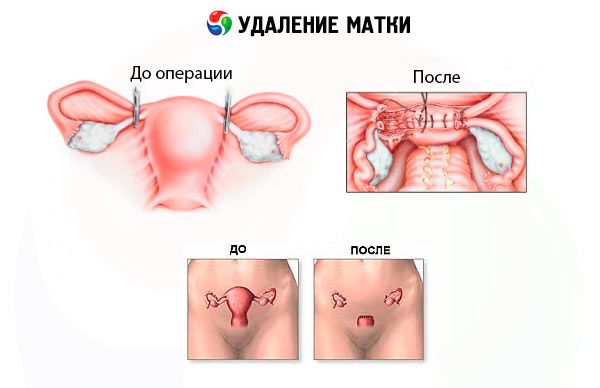Medical expert of the article
New publications
Symptoms of menopause after removal of the uterus
Last reviewed: 04.07.2025

All iLive content is medically reviewed or fact checked to ensure as much factual accuracy as possible.
We have strict sourcing guidelines and only link to reputable media sites, academic research institutions and, whenever possible, medically peer reviewed studies. Note that the numbers in parentheses ([1], [2], etc.) are clickable links to these studies.
If you feel that any of our content is inaccurate, out-of-date, or otherwise questionable, please select it and press Ctrl + Enter.

Radical intervention for hysterectomy (amputation of the uterus) is now quite common. Statistics show that approximately one third of women over 45 have undergone this operation to a greater or lesser extent.
Many women soon after hysterectomy begin to feel the symptoms of the onset of menopause. After all, the absence of only the uterus deprives the ovaries of the main blood flow from the branches of the uterine artery, and the insufficient blood supply gradually leads to organ dystrophy. According to observations, even in cases of only the uterus being removed, the climacteric period occurs in women who have undergone surgery for this reason five to seven years earlier than natural. And after hysterovariectomy, which is performed much less frequently, the first signs of the so-called surgical menopause are felt almost in the first days after the operation.
Surgical menopause is usually more severe than natural menopause, when the ovaries gradually stop working. Radical changes in hormonal levels caused by the sudden cessation of hormone production are most acutely felt by patients of fertile age. Regardless of the volume of surgery, the level of sex hormones decreases significantly the day after the amputation of one or more reproductive organs. And after bilateral removal of the ovaries and uterus, against the background of severe estrogen deficiency, patients develop postovariectomy syndrome - a combination of psychoneurological, vegetative-vascular and metabolic-endocrine pathologies.
The severity of menopausal symptoms depends on the condition of the female body and a bouquet of concomitant diseases. It can be assumed that total hysterovariectomy is not indicated for absolutely healthy women, therefore the vast majority of those operated on endure surgical menopause with difficulty.
The very first and most characteristic symptom is hot flashes. Surgical menopause occurs instantly, therefore, the symptoms of menopause are more pronounced and intense. Hot flashes are manifested by a sudden increase in the temperature of the upper body and intense sweating, usually accompanied by reddening of the skin of the face and neck. This is often accompanied by a jump in blood pressure. The fever subsides quite quickly and is replaced by chills. Hot flashes can occur up to 50 times a day. At night, women often wake up in a bed wet with sweat and are forced to completely change their clothes and bed linen. This condition can last from three to five years. Only a fifth of women manage to get rid of hot flashes and night sweats quickly enough - within a year. Disorders of the autonomic nervous system are manifested by migraine-like pains and dizziness, rapid heartbeat, numbness of the limbs. More than half of the women who underwent surgery complain of similar symptoms.
Hormonal changes contribute to the development of fatigue and decreased performance. The ovaries produce not only female sex hormones, but also androgens. Their deficiency increases the symptoms of surgical menopause.
All the listed symptoms cannot but affect the psycho-emotional state. Mental changes manifest themselves in the form of increased excitability, irritability, tearfulness. A woman's sleep, appetite, and sexual desire are disturbed, she experiences insecurity in herself and her future, anxiety, and a feeling of emptiness. This condition is often complicated by severe depressive disorders.
Hormonal changes often cause vaginal dryness and itching, a recognized symptom of estrogen deficiency, which leads to insufficient hydration of the mucous membrane and a decrease in its thickness. Sexual intercourse is accompanied by painful sensations, which can further exacerbate a woman's depressive mood.
Insufficient estrogen affects cognitive abilities, adversely affecting memory and learning ability. And anxiety, fear, insomnia, irritability are aggravated by forgetfulness and confusion.
Other changes in the body also appear somewhat later. Their symptoms do not become noticeable immediately, however, in most cases, with surgical menopause, changes in metabolism are not long in coming, leading to a lack of production and absorption of calcium by bone tissue. These changes occur very quickly after surgery, and within a year the bones become more fragile. According to research, bone loss during the first postoperative year can reach 17%. Osteoporosis increases the likelihood of fractures, so patients are prescribed preventive therapy with calcium and vitamin D after surgery.
Deficiency of female sex hormones affects the functioning of the cardiovascular system, increasing the risk of atherosclerosis, heart attack, and stroke.

Problems with the urinary organs may begin, more than half of patients with removed genitals suffer from urinary incontinence, painful urination, frequent infectious and inflammatory diseases of the urinary tract,
The lack of estrogens also affects a woman's appearance. The production of natural collagen and elastin decreases, skin hydration becomes insufficiently intense, a network of wrinkles appears, the quality of hair and nails deteriorates - they become brittle and dull.
The onset of menopause marks the beginning of the aging process of the body, and the artificial and abrupt introduction of the female body into this process exacerbates its unpleasant symptoms. To compensate for hormonal insufficiency and smooth out the symptoms of surgical menopause, women are recommended hormone replacement therapy.
 [ 1 ]
[ 1 ]

